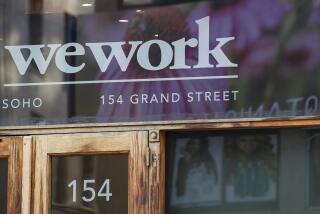ExciteAtHome Warns SEC of Financial Peril
- Share via
ExciteAtHome Corp., the high-speed Internet company that once was poised to dominate the next generation of online services, is on the verge of falling into the broadband rubble, its auditors warned Monday.
The disclosure added new urgency to the company’s mounting financial difficulties, which stem in part from the decline in Internet advertising. Making matters worse, the news cut ExciteAtHome’s already-flattened stock price almost in half, increasing the risk of a disastrous cash shortage.
“They’re teetering on the brink,” said analyst Michael Harris of Kinetic Strategies, a research firm specializing in high-speed Internet access.
If the Redwood City, Calif.-based company, also known as AtHome Corp., were to go bankrupt, it would be the latest in a series of fast-growing Internet access companies to collapse under its own weight. But analysts say ExciteAtHome’s partners in the cable industry probably will cushion any blow to consumers, keeping their high-speed Internet services running until a replacement can be found.
ExciteAtHome’s fortunes epitomize the heady rise and rapid descent of many Net companies, particularly those involved in high-speed access.
Its exclusive deals with AT&T; Corp., Comcast Corp. and other top cable TV companies gave it a huge advantage over competitors, who lobbied vigorously but unsuccessfully for regulations opening the cable networks to all Internet providers.
Investors’ initial enthusiasm drove ExciteAtHome’s stock sky high, enabling the company to buy the popular Excite portal in 1999 for $6.7 billion, as well as several other advertiser-supported content services.
But ExciteAtHome’s cable partners have taken longer than expected to ready their networks for Internet service, impeding ExciteAtHome from recouping the huge upfront investments it has made. And the protracted slump in Internet advertising has turned the content side of ExciteAtHome’s business from a cash cow into a money pit.
“I think it’s fair to say, with 20-20 hindsight, that the acquisition of Excite and the media business was a terrible, terrible mistake,” Harris said.
At its peak in April 1999, ExciteAtHome traded for almost $95 a share. The stock closed Monday at 47 cents in heavy trading on the Nasdaq Stock Market, down 40 cents, or 46%, from Friday.
On Monday, ExciteAtHome filed an amended annual report with the Securities and Exchange Commission that included a new estimate by auditors Ernst & Young of the company’s ability to remain afloat.
Financial challenges “raise substantial doubt about the company’s ability to continue as a going concern,” the auditors say in the filing.
In particular, the auditors noted that ExciteAtHome raised $100 million in loans in June that would have to be repaid immediately if the Nasdaq market dropped the company’s stock from its listings.
The company’s share price recently fell below the minimum required by Nasdaq, raising the possibility that the stock will be delisted.
ExciteAtHome spokeswoman Alison Bowman downplayed the warning from Ernst & Young, saying the risks already had been disclosed.
The company may try to resuscitate its stock price by slashing the number of outstanding shares. It’s also exploring ways to sell some of its assets and cut costs, Bowman said.
AT&T;, which owns 23% of the company but controls 74% of its voting shares, declined to comment on the filing, as did Comcast and Cox Communications Inc., each of which owns 6% to 7% of ExciteAtHome.
“I don’t think the average AtHome subscriber is going to wake up one day and not have service,” Harris said. “I don’t think the cable operators are going to allow that.”
Cox spokeswoman Laura Oberhelman agreed, saying, “We do remain absolutely committed to providing our customers with uninterrupted high-speed Internet access.”
ExciteAtHome lost $7.4 billion in 2000, with $7 billion of that total reflecting the declining value of intangible assets. It reported operating losses of $127 million in the first half of this year, and total losses of almost $1.2 billion.







